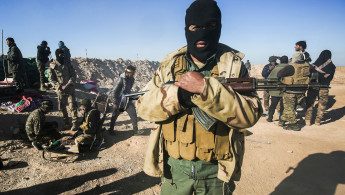Another US u-turn as commander praises controversial Iraqi militias
The US has praised Iraqi forces fighting the Islamic State group in Mosul, along with a controversial group of militias with links to Iran and accused of major human rights abuses.
Lieutenant General Stephen Townsend made a rare acknowledgement of the mostly Shia militia umbrella as Iraqi forces announced the launch of an offensive to take west Mosul from IS.
"The entire [US-led] coalition salutes and wishes God's blessings on the brave Iraqi soldiers, police and militias who today are fighting to liberate their country and make the region and the world a safer place," Townsend said in a statement, the commander of the US-led anti-IS coalition.
The Popular Mobilisation Forces (Hashed al-Shaabi in Arabic) have played a key role in the fight back against IS after the Iraqi army's humiliating retreat from the north of the country in 2014.
However, the militias have also been linked to a number of massacres and human rights abuses during Baghdad's efforts to liberate mostly Sunni northern Iraq from IS.
Some of the militias in the umbrella are also allegedly funded, motivated and trained by Hizballah and Iran.
This has led the US-led coalition to not, openly at least, provide direct support for the Popular Mobilisation Forces and instead focused of supporting the Iraqi army and elite military units.
Iraq has also formally excluded the militias from the four-month-old operation to take Mosul, fearing the pro-Baghdad militants could commit more reprisals against civilians in the city.
Instead, the pro-government forces are positioned to the less populated western areas of Mosul and around Tal Afar, where they hope to block an IS retreat towards Syria and cut off supplies to jihadis in the besieged city.
"Mosul would be a tough fight for any army in the world, and the Iraqi forces have risen to the challenge," Townsend said in the statement.
"They have taken the fight to the enemy and sacrificed their blood for the people of Iraq and the rest of the world."
Iraq became polarised on ethnic and sectarian grounds following the 2003 US-led invasion, with only weak central rule.
Shia and Sunni militias fought a brutal civil war using bombings, shootings and kidnappings to instil fear in the rival sects and leaving hundreds of thousands of dead.
The Popular Mobilisation Forces is made up largely up Shia militias who were connected to some of these killings. The movement has since been formally put under government control and viewed as a paramilitary wing of the Iraqi armed forces.
Agencies contributed to this story.





 Follow the Middle East's top stories in English at The New Arab on Google News
Follow the Middle East's top stories in English at The New Arab on Google News


